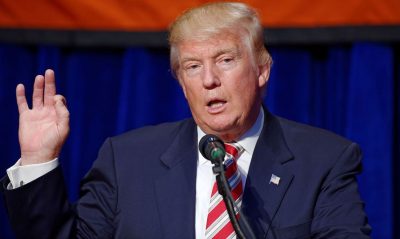Is Trump Too Mentally Unstable to Govern?

VISIT MY NEW WEB SITE:
Contact at [email protected].
A previous article asked if he’s the world’s most dangerous man, his deplorable actions suggesting he’s unfit to govern.
Mental health experts were quoted, citing evidence of sociopathic traits, threatening wars and other forms of violence, approving of torture, boasting of getting away with sexual assaults, experts believing its erroneous to consider him a normal president.
On September 28, Psychology Today headlined “The Dangerous Case of Donald Trump – A new book delves into the president’s mental health.”
Psychologist John Gartner warned about Trump’s unfitness for office. He founded Duty to Warn, “an association of mental health professionals and other concerned citizens who advocate Trump’s removal under the 25th Amendment on the grounds that he is psychologically unfit.”
More than 60,000 mental health professionals signed Gartner’s petition, stating:
“We, the undersigned mental health professionals, believe in our professional judgment that Donald Trump manifests a serious mental illness that renders him psychologically incapable of competently discharging the duties of President of the United States.”
“And we respectfully request he be removed from office, according to article 4 of the 25th amendment to the Constitution, which states that the president will be replaced if he is ‘unable to discharge the powers and duties of his office.’ “
Strong stuff! Yet a question arises. Is it ethical and proper for mental health experts to diagnose an individual without personally examining and analyzing them.
The so-called American Psychiatric Association’s 1973 Goldwater Rule states it’s unethical to give a professional opinion about a public figure they’re not personally examined – including consent from the individual to disclose their mental health publicly.
Gartner contends he and thousands of other mental health professionals signing his petition are obligated to protect the public from a president posing a clear and present danger – thus, overriding the Goldwater Rule.
In her book titled “The Dangerous Case of Donald Trump: 27 Psychiatrists and Mental Health Experts Assess a President,” Bandy Lee, clinical professor, Yale Law and Psychiatry Division, co-founder and director of the Violence and Health Study Group, said the following in the book’s introduction:
“We are asking our fellow mental health professionals to get involved in politics not only as citizens, but also, specifically, as professionals and as guardians of special knowledge with which they have been entrusted.”
“How can we be sure that this is permissible? It is all too easy to claim, just as we have done, that an emergency situation requires a departure from our usual practices in the private sphere. How can we judge whether in fact our political involvement is justified?”
“We would argue that the key question is whether professionals are engaging in political collusion with state abuses of power, or in resistance to them.”
“If we are asked to cooperate with state programs that violate human rights, then regardless of the purported justification, any involvement can only corrupt, and the only appropriate ethical stance is to refuse participation of any sort.”
“If, on the other hand, we perceive that state power is being abused by an executive who seems to be mentally unstable, then we may certainly speak out, not only as citizens, but also, we would argue, as professionals who are privy to special information and a responsibility to educate the public.”
“For whatever our wisdom and expertise may be worth, surely we are obligated to share it.”
On November 30, in a letter to the New York Times, Lee commented further, saying:
“We are currently witnessing more than (Trump’s) usual state of instability – in fact, a pattern of decompensation: increasing loss of touch with reality, marked signs of volatility and unpredictable behavior, and an attraction to violence as a means of coping. These characteristics place our country and the world at extreme risk of danger.”
“Ordinarily, we carry out a routine process for treating people who are dangerous: containment, removal from access to weapons and an urgent evaluation.”
“We have been unable to do so because of Mr. Trump’s status as president. But the power of the presidency and the type of arsenal he has access to should raise greater alarm, not less.”
“We urge the public and the lawmakers of this country to push for an urgent evaluation of the president, for which we are in the process of developing a separate but independent expert panel, capable of meeting and carrying out all medical standards of care.”
I’ve written numerous times about Trump’s rage for war, his extreme hostility toward North Korea and Iran.
Attacking either country would be catastrophic. Both have powerful military capabilities able to respond strongly.
The nuclear armed DPRK has the world’s fourth largest military, including tens of thousands of highly trained special forces, around 10,000 artillery pieces and mobile missiles able to strike Seoul and US military bases, its missile capability able to devastate Tokyo.
Iran has over half a million active duty military personnel, sophisticated weapons technology, the Middle East’s “most powerful military force” (along with nuclear armed Israel), according to retired US General John Abizaid.
Neither country wants war. They threaten no other nations. Though no match for America’s military might, they’d be formidable adversaries if attacked.
They’d respond with all weapons in their arsenals needed to defend their countries. Preemptive US war against them would devastate both regions.
Is Trump recklessly bent on attacking them? Is he too mentally unstable to prevent catastrophic wars in both regions – risking global war involving Russia and China?
Stephen Lendman is a Research Associate of the CRG, Correspondent of Global Research based in Chicago.
VISIT MY NEW WEB SITE: stephenlendman.org (Home – Stephen Lendman). Contact at [email protected].
My newest book as editor and contributor is titled “Flashpoint in Ukraine: How the US Drive for Hegemony Risks WW III.”

